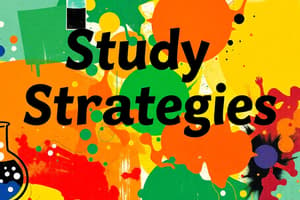Podcast
Questions and Answers
What is the primary purpose of SLGs?
What is the primary purpose of SLGs?
- To provide a one-on-one tutoring experience
- To facilitate guided study in a group setting (correct)
- To serve as a replacement for lectures
- To prepare students for exams through quizzes
Which of the following is NOT a recommended study tip?
Which of the following is NOT a recommended study tip?
- Review lecture notes throughout the semester
- Attend office hours to ask professors questions
- Avoid using textbooks to save time (correct)
- Make summary pages of notes at the end of each week
What should students do to address gaps in their knowledge?
What should students do to address gaps in their knowledge?
- Focus solely on past exam questions
- Create mind maps for confusing concepts (correct)
- Skip reviewing notes if they understand the basics
- Rely on memorization without practice
How can students best utilize office hours?
How can students best utilize office hours?
What is a key benefit of attending seminars even with small attendance marks?
What is a key benefit of attending seminars even with small attendance marks?
Which activity is NOT part of a typical SLG session?
Which activity is NOT part of a typical SLG session?
What study habit is encouraged to avoid before exams?
What study habit is encouraged to avoid before exams?
Why should students create test questions with friends?
Why should students create test questions with friends?
Flashcards
SLG
SLG
Facilitated study session in a group setting.
Study Tips
Study Tips
Strategies for effective learning.
Lecture Notes
Lecture Notes
Written records of lecture content.
Office Hours
Office Hours
Signup and view all the flashcards
Discussion board
Discussion board
Signup and view all the flashcards
Quiz each other
Quiz each other
Signup and view all the flashcards
Avoid Cramming
Avoid Cramming
Signup and view all the flashcards
Mind maps
Mind maps
Signup and view all the flashcards
Study Notes
SLG Sessions
- SLGs are facilitated/guided study sessions in a group setting
- They are drop-in, free, and voluntary
- They are a helpful way to cover course material and develop effective study strategies and habits
Today's Agenda
- Introductory Activity
- Activity 1
- Activity 2
- Activity 3
- Closing Activity
Student Wellness Services
- Counselling
- Student Health Services
- Health & Performance Centre (HPC)
- Student Support Network (SSN)
- Wellness Education & Promotion Centre
- Student Accessibility Services (SAS)
- Sexual and Gender Based Violence Support & Education
Study Tips
- Take notes during lectures (laptop or handwritten)
- Review notes before each class
- Review notes after each lecture, focusing on areas needing clarification
- Identify knowledge gaps
- Ask professors questions during office hours
- Utilize discussion boards and SLG friends
- Practice with textbook questions
- Create practice questions with classmates
- Develop mind maps for complex concepts
- Paraphrase lecture notes to aid understanding
- Review notes throughout the semester
- Create summary pages of notes
- Take advantage of easy marks (e.g., attendance in seminars)
Disclaimer
- SLG leaders are not teaching assistants, tutors, or professors
- They cannot provide answers or predict exam questions
- Mistakes in the review materials may not be caught outside of the session
Goal of the Session
- Analyze multiple-choice questions as a group
- Determine correct answers, focusing on critical thinking
- Review all required content for the final exam (if time allows)
- Facilitated by student input
Accessibility Statement
- Students with accommodations should contact their SLG leader or the SLG program for support.
Memory
- Definition: Memory is the persistence of learning over time through the storage and retrieval of information and skills.
- Short-Term Memory: Holds about 7 +/- 2 chunks of information
- Memory Strategies: Re-reading, encoding, and many shorter study sessions, self-testing and quizzing are helpful
- Long-Term Memory: Each individual has a certain capacity, and as you age the process becomes more elaborate and interconnected.
- Explicit Memory: This involves conscious memories, like recalling events (flashbulb memory), or facts
- Types of Memory are recall, recognition, relearning, or restoration.
- Theory of Mind: The ability to see things from someone else's perspective
Other Topics (From Questions)
- Forgetting: Encoding failure, storage decay, and retrieval failure are all mechanisms of forgetting
- Reinforcement/Punishment: Reinforcement encourages a behaviour while punishment discourages a behaviour. Reinforcement tries to encourage a desirable behaviour while punishment tries to reduce an undesirable behaviour.
- Types of Reinforcement: Fixed-ratio, fixed-interval, variable-interval, and variable-ratio.
- Cognitive Dissonance: This occurs when one's behaviour contradicts existing beliefs.
- Attitudes: Conditions where attitudes can accurately predict behaviour include stable attitudes, central to a person's identity, and specific to behaviours.
Studying That Suits You
Use AI to generate personalized quizzes and flashcards to suit your learning preferences.




